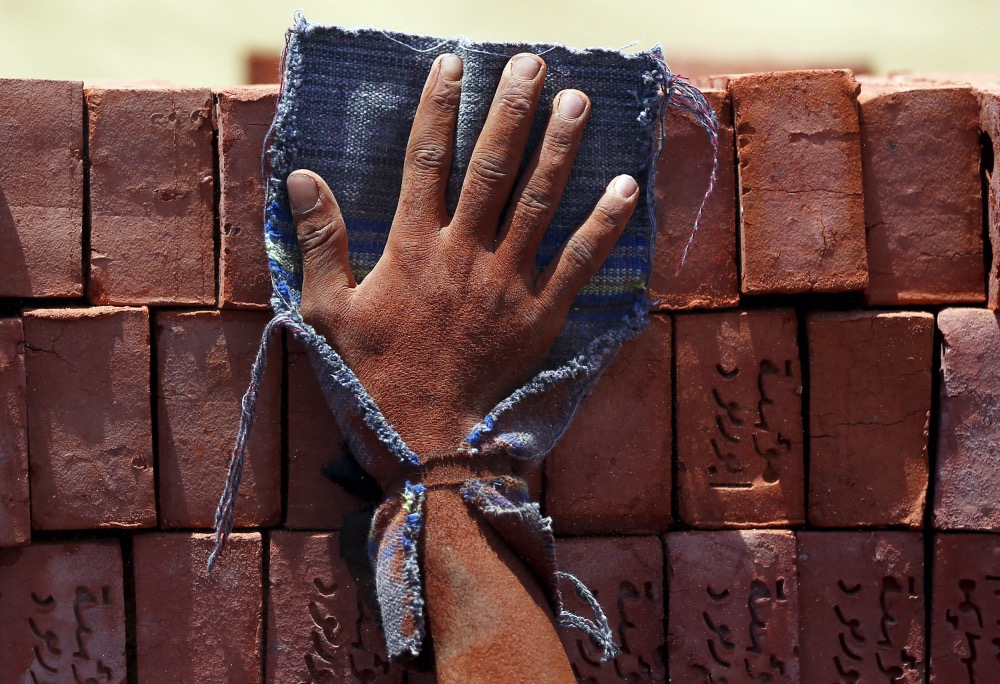London, UK
Thomson Reuters Foundation
As the new chief executive of the four-year-old Global Fund to End Modern Slavery, Alex Thier has an ambitious goal – raise enough money to make human trafficking unprofitable.
Hailed as a disruptive innovator at its birth – with backing from the US and British governments – the public-private partnership aimed to replicate the success of other initiatives like the Global Fund to Fight AIDS, Tuberculosis and Malaria.

A hand of a labourer pushes bricks at a traditional brick factory in Arab Mesad district of Helwan, north-east of Cairo, on 14th May, 2015. About 45 labourers are employed at the brick factory and most work 10 hours a day. Adult workers earn a daily wage of 70 Egyptian pounds ($US9) and child workers earn 40 Egyptian pounds ($US5). The labourers, who are usually temporary or seasonally employed in Egypt’s brick-making industry, experience unsafe work conditions, according to local media. Picture taken on 14th May, 2015. PICTURE: Reuters/Amr Abdallah Dalsh/File photo.
GFEMS has so far raised five per cent of its original $US1.5 billion goal, mainly from four donors, with little of the envisaged cash from the private sector, which has yet to buy into the idea that strategic spending can transform the global anti-slavery drive.
“We are going to need to convince not only new donors but existing ones and other groups – in philanthropy and the private sector – that there is something truly transformational that can be done in this fight,” Thier said in a telephone interview.
“The sector is at an inflection point…it’s time to professionalise the approach and scale up resources,” he said, describing GFEMS as a “start-up” that had made good progress.
Thier, who previously led the Overseas Development Institute, a London-based think-tank, and worked at the US Agency for International Development (USAID), has a long to-do list: get more funding, better data and create systemic change.
Scarce data, poor coordination, and varying views on how to define the crime have generally limited the impact of anti-slavery spending, academics say, while recent research found it was not an overseas development aid priority for most nations.
GFEMS’ focus is on cutting the supply of modern slaves in the hardest-hit nations and the demand for cheap products, using new tools and models that it hopes can be scaled up to bring sustainable global solutions that do not rely on donor funding.
The fund has invested about half of the $US80 million raised to-date on projects in countries from India and Kenya to Vietnam – focusing on domestic work, the construction and garment sectors and sex trafficking – and spent $US10 million on research.
Value for money?
Thier said GFEMS is also helping communities at risk of slavery that have been hit by the fallout from COVID-19, and that focusing on specific areas allows it to learn what works in local contexts and demonstrate the value of its approach.
But the effectiveness of GFEMS has been questioned, including by Britain’s aid watchdog over value for money of the £20 million investment. Some experts said the fund would likely take time to prove its worth and gain more donors.
Nick Grono, head of the Freedom Fund – the largest private anti-slavery donor fund – said GFEMS’s progress had slowed recently after an encouraging start as it “confronts the reality of its early ambition to raise hundreds of millions of dollars”.
Yet Thier said GFEMS had the potential to make a meaningful impact tackling modern slavery in a couple of locations or industries at first – pointing to global development gains in addressing health crises and extreme poverty as inspiration.
“You can have places where modern slavery is a terrible problem today, and won’t be in 10 years,” Thier said.
“But if we’re going to achieve that, it can’t be business as usual,” he said. “We’re going to need to do things differently.”
GFEMS has been nominated for a Stop Slavery Award by the Thomson Reuters Foundation. The Thomson Reuters Foundation’s journalists have no involvement in the award’s judging process.






